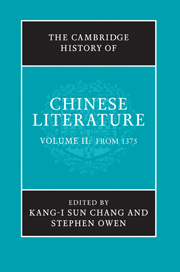Book contents
- Frontmatter
- Introduction to Volume II
- 1 Literature of the early Ming to mid-Ming (1375–1572)
- 2 The literary culture of the late Ming (1573–1644)
- 3 Early Qing to 1723
- 4 The literati era and its demise (1723–1840)
- 5 Prosimetric and verse narrative
- 6 Chinese literature from 1841 to 1937
- 7 Chinese literature from 1937 to the present
- Epilogue: Sinophone writings and the Chinese diaspora
- Select Bibliography
- Glossary
- Index
Introduction to Volume II
Published online by Cambridge University Press: 28 May 2011
- Frontmatter
- Introduction to Volume II
- 1 Literature of the early Ming to mid-Ming (1375–1572)
- 2 The literary culture of the late Ming (1573–1644)
- 3 Early Qing to 1723
- 4 The literati era and its demise (1723–1840)
- 5 Prosimetric and verse narrative
- 6 Chinese literature from 1841 to 1937
- 7 Chinese literature from 1937 to the present
- Epilogue: Sinophone writings and the Chinese diaspora
- Select Bibliography
- Glossary
- Index
Summary
The second volume of the Cambridge History of Chinese Literature is comparable in chronological scope to the single-volume Cambridge series in European literatures. Using the year 1375 – rather than the standard date of 1368 (i.e. the first year of the Ming dynasty) – as the temporal division between the first and second volumes brings to light our unique approach to the question of periodization. Thus far, almost all available histories of Chinese literature periodize by dynasty, so we cannot dispense with this habit completely. We have chosen, however, to divide periods differently whenever dynastic periodization becomes problematic. For example, although the Ming dynasty was founded in 1368, in terms of literary history the year 1375 is by far the more important date to remember. By the year 1375, the important surviving intellectuals from the Yuan, such as Yang Weizhen (1296–1370), Ni Can (1301–1374), and Liu Ji (1311–1375), had already died. More importantly, in 1374, Zhu Yuanzhang, the Hongwu Emperor and founding father of the Ming (r. 1368–1398), executed the great poet Gao Qi (1336–1374) and hence inaugurated a reign of terror for intellectuals. To a certain extent, the distinctive early Ming culture began with the advent of Zhu Yuanzhang’s brutal political persecution, which would obliterate nearly an entire generation of poets brought up in the last years of Mongol rule.
It was not until around 1400 that literature had the chance to flourish again after a long hiatus, when the Yongle Emperor (r. 1403–1424) began to initiate his many ambitious literary and cultural projects. Given this clear division in the literary history of the period, it seems most useful to commence the second volume of the Cambridge History of Chinese Literature with the year 1375, while allowing for some overlap in material. Similarly, we have placed the May Fourth Movement of 1919 not at the beginning of “modernity,” as is traditionally done, but rather in the middle of a longer process starting in the latter part of the Qing. (See Chapter 6, “Chinese literature from 1841 to 1937,” by David Der-wei Wang.)
- Type
- Chapter
- Information
- The Cambridge History of Chinese Literature , pp. xxiii - xxxiiPublisher: Cambridge University PressPrint publication year: 2010



